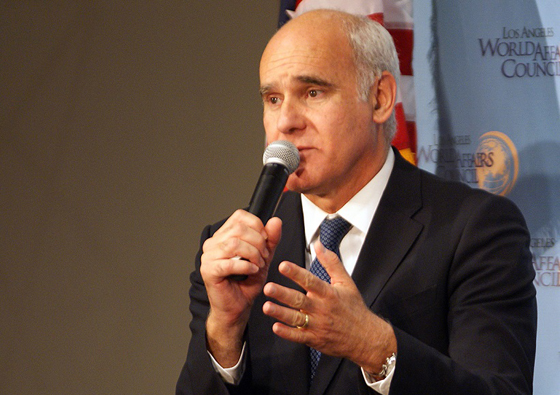
Europe is now facing its most difficult security crisis since the fall of the Soviet Union in the 1980s, and despite criticism that is has not done enough to help Ukraine, “I can assure you that we will be tough on Mr Putin,” said João Vale de Almeida, the European Union Ambassador to the United States. The sanctions imposed so far in retaliation for the annexation of Crimea have been narrowly targeted at a small group of people around President Putin, and are not intended to hurt the Russian people as a whole. “We want to target the sanctions where they count - against those who call the shots in Russia....Russia’s behavior is a few centuries outdated, we don’t accept it and we want it to end.”
Speaking to the Los Angeles World Affairs Council on Wednesday, Vale de Almeida said “There is a strong sense of common purpose between Europeans and the Americans, and we are ready to go to the third stage of sanctions if necessary.” But faced with repeated questions about why Europe had not done more after Putin’s annexation of Crimea, Vale de Almeida said that Europe is Russia’s number one trading partner (the US, he said, is number 29) and so there are closer economic ties. And he added that European leaders were always thinking of what their alternatives were, “and nobody wants to send young Europeans and young Americans to the fields of Ukraine to fight the Russians.”
Asked whether Putin was behaving rationally, Vale de Almeida said “difficult to assess - I am not a doctor.” Then he added: “Is Mr Putin the last representative of the KGB generation? We hope so.”
On the recent EU elections, in which 25% of the electorate voted for parties that opposed the EU or were skeptical about some EU policies, Vale de Almeida conceded it was a “wake-up call”, and conceded there is “a certain bad feeling” in Europe today, prompted largely by the recent economic crisis. “Nobody is perfect. We need to address our weaknesses.” But he said the European parliament would continue to work as before, and said this is “not an existential crisis” for the EU. And he said that the crisis in the Ukraine should not divide the US and Europe, at a time where they are negotiating the Transatlantic Trade and Investment Partnership (TTIP), “potentially the biggest free trade pact in the world,” that would bring together 800 million people who would be responsible for about 50% of the world’s economy.
Asked about the possibility of Turkey joining the EU, the ambassador said that they were applying and could ultimately join “if they reform certain things to make them compatible with our standards in Europe. Lately the internal situation in Turkey has not been very helpful, with moves to limit freedom of expression.”
He said the Snowden affair, which has revealed, among other things, that the NSA had been listening in on the cell phone conversations of allies including German Chancellor Angela Merkel, has “reduced the level of trust with our American friends.” You know there are some people in Europe who don’t like the US,” he said, to which someone in the audience said “No!” in mock horror, causing much mirth amongst the rest of the audience.
And when asked whether he - as a Portuguese - had any predictions for who might win the World Cup starting in Brazil this month, the ambassador diplomatically said “I hope a team from the European Union wins the World Cup.”
